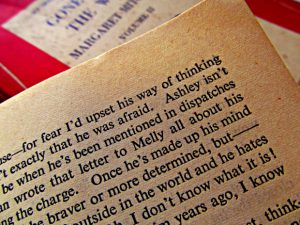 I watched a discussion at the Independent Publishing Conference where a panellist said he didn’t believe in the ‘fetishisation’ of the print book as a reason readers preferred it over the ebook. This means he didn’t believe people enjoyed the print book for things like its texture, the smell of its pages, the shape of the words, etc.
I watched a discussion at the Independent Publishing Conference where a panellist said he didn’t believe in the ‘fetishisation’ of the print book as a reason readers preferred it over the ebook. This means he didn’t believe people enjoyed the print book for things like its texture, the smell of its pages, the shape of the words, etc.
Yet most readers maintain their allegiance to the print book. That’s worth thinking about given it wasn’t too long ago many thought the emergence of the ebook would eliminate the need for the print book. That hasn’t happened. Ebooks spiked early with their sales, then hit a plateau. The print book remains as strong as ever.
Why?
The ebook is a form of convenience. From a practical standpoint, we’re don’t need to cut down trees to print ebooks. They’re cheaper and you can carry numerous books on your reader, rather than have to lug around enough books to give you a hernia. You can order any books – even ones that would be difficult (if not impossible) to obtain in print – and have them delivered to your reader instantly. If you have readers across multiple platforms (e.g. on your tablet, on your phone) they’ll automatically synchronise where you’re up to, so you’ll never lose your page regardless of where you’re reading. These are all undeniable advantages.
But readers are still faithful to the vehicle – in this case, the printed form.
And, of course, a fetishisation exists, because fetishisation exists in everyday society. Where would you enjoy a movie most – in Gold Class, IMAX, a normal cinema, watching a BluRay, a DVD, on your tablet, or on your phone? If fetishisation didn’t exist, it wouldn’t matter where you watched it, because you’d only be concerned about the content. What would you rather drive – a Ferrari, a Ford, or a KIA? If you were going out to a wedding, do you dress in your finest, in everyday casual-wear, in a tracksuit, or in your pyjamas? If you wanted to enjoy an art exhibition, would you go see Rembrandt or Joe Blow?
These examples can go on. They exist in every level of life – material, cultural, and functional. It matters to us how things look. If it didn’t, we’d dress the same, look the same, and have the same tastes. We wouldn’t lament cloudy days and revel in sunny days. Art (in any form) wouldn’t exist because we couldn’t possibly have an appreciation for it. There would be nothing but pragmatism. Everything else would only exist as a means to an end.
But appearance – and particularly beauty – appeal to us.
Why should books be any different? This is why people will collect different editions with new covers, new sizes, new looks – that fetishisation of the form matters. It gives us a tactile connection to the physical form, just as we can have tactile connections to locations, to sounds (like songs), to smells, etc. It’s about how the world resonates with us, how we interpret it, and what that interpretation means to us.
Surely, this is something the manufacturers of ebook readers recognise, given they continually strive to make ebooks look more like printed books. They try to duplicate paper colouring, the resolution of fonts, and the cosmetics behind the layout. They’ve even gone as far now to create the illusion of a page being turned. If the fetishisation of the printed form didn’t matter, why would the manufacturers bother? Why wouldn’t it just come down to electronic text on an electronic page? The answer is obviously it does matter and manufacturers are trying to duplicate that very real connection readers develop – and nurture – with the printed form.
